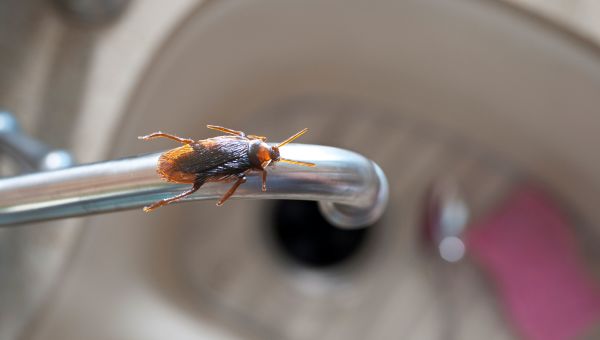What's causing your cold weather allergies?
For some, winter's chill doesn’t keep allergy symptoms at bay. Find out which indoor triggers are causing your coughing, sneezing and watery eyes.

Freezing temperatures might bring allergy sufferers relief from coughing, sneezing and watery eyes, but not everyone is in the clear. Millions of people have perennial allergic rhinitis—or year-round allergy symptoms—and are often sensitive to indoor triggers, like dust and dander. It's a big problem in the winter months, when you spend more time inside with doors and… Show More
Freezing temperatures might bring allergy sufferers relief from coughing, sneezing and watery eyes, but not everyone is in the clear. Millions of people have perennial allergic rhinitis—or year-round allergy symptoms—and are often sensitive to indoor triggers, like dust and dander. It's a big problem in the winter months, when you spend more time inside with doors and windows closed. There are ways to get relief, however.
To help you stay sneeze-free, we spoke with Mark Schecker, MD, an allergist with Grand Strand Medical Center in Myrtle Beach, South Carolina. He breaks down some of the most irritating symptoms and common indoor triggers, as well as a few treatment options.
Show Less
Symptoms of Seasonal Allergies
Typically, your immune system protects against bacteria and viruses. But if you have an allergy, your body reacts disproportionately to something that normally should not cause a reaction. Though we don't know why allergies develop, says Dr. Schecker, "we know these things seem to be inherited."
Typically, your immune system protects against bacteria and viruses. But if you have an allergy, your body reacts disproportionately to something that normally should not cause a reaction. Though we don't know why allergies develop, says Dr. Schecker, "we know these things seem to be inherited."
Common allergy symptoms include:
- Congestion
- Itchy throat and mouth
- Excess mucus
- Coughing and wheezing
- Itchy, watery or swollen eyes
- Sneezing and runny nose
Allergens can also worsen asthma, eczema and sinus problems, so it's especially important to avoid triggers if you have any of these conditions.
Don't mistake allergy-related coughing and sneezing for a common cold or flu, which peaks from December to February. These ailments have different triggers, symptoms and treatments. A fever, body aches and a sore throat often point to a cold, but cold and allergy symptoms vary widely. If symptoms last longer than a few weeks or include itchy eyes, you may be experiencing an allergy. See your healthcare provider (HCP) for discomfort that won't quit.
Show Less
Allergen: Pet Dander
Pet allergies are common but those with a family history of allergies or asthma may have a greater risk. Symptoms can appear within minutes of exposure to a cat, dog or any animal with fur, or take up to 12 hours to develop.
If you know you are allergic to certain pets, the best thing you… Show More
Pet allergies are common but those with a family history of allergies or asthma may have a greater risk. Symptoms can appear within minutes of exposure to a cat, dog or any animal with fur, or take up to 12 hours to develop.
If you know you are allergic to certain pets, the best thing you can do is minimize contact. But even if you avoid cuddling with your pet, their hair, saliva, urine and dander (dead flakes of skin) can stick to carpets, furniture and clothing. Try to keep animals out of the bedroom and off furniture.
Vacuum your carpets often or invest in hardwood, tile or linoleum floors.
"Washing the animal may reduce the amount of allergens they produce in their dander," Schecker suggests. The jury is still out on whether or not extra tub time will help, especially since it won’t help cut down on pet urine or saliva, but it could be worth a shot. You can also speak with an allergist about treatments.
A family history of asthma and allergies make you more likely to react to animal allergens. If a close relative is allergic to pets, get tested before you bring one home.
Show Less
Allergen: Mold
Mold needs moisture to grow, so it's typically found in damp places, like bathrooms, basements, laundry rooms and the soil of house plants. It releases tiny spores into the air that can hide in fabrics, carpets, stuffed animals, the soil of some houseplants and on wallpaper.
To stop the spread, use… Show More
Mold needs moisture to grow, so it's typically found in damp places, like bathrooms, basements, laundry rooms and the soil of house plants. It releases tiny spores into the air that can hide in fabrics, carpets, stuffed animals, the soil of some houseplants and on wallpaper.
To stop the spread, use a dehumidifier to keep humidity levels at or below 50 percent. On warm days, keep doors and windows closed and use an air conditioner with a HEPA (high-efficiency particulate air) filter to trap mold spores. Minimize exposure also by:
- Ventilating bathrooms with an exhaust fan or cracking a window after a bath or shower
- Changing furnace and air conditioner filters regularly
- Keeping showers, tubs and sinks clean and dry and kitchen sinks free of dishes
- Wiping down refrigerator shelves and tossing spoiled food
- Removing wallpaper from bathrooms and carpeting from the basement
- Giving houseplants to a friend if you notice mold in the soil and think it may be causing an allergic reaction.
To minimize the spread of houseplant mold spores, try switching to commercial potting soil and avoiding overwatering.
Show Less
Allergen: Dust Mites
These mites—which live in house dust—are too small to see with the naked eye and thrive in warm, humid climates. The three most common hiding places, according to Schecker: the bed or mattress, carpeting and upholstered furniture. "We get most of our dust mite exposure from our beds and bedrooms,… Show More
These mites—which live in house dust—are too small to see with the naked eye and thrive in warm, humid climates. The three most common hiding places, according to Schecker: the bed or mattress, carpeting and upholstered furniture. "We get most of our dust mite exposure from our beds and bedrooms, because people usually spend most of their time there," he adds.
To reduce symptoms, lower in-home humidity with a dehumidifier and empty the chamber regularly. Limiting the amount of dust that collects in your home can also help. Try to:
- Keep floors and surfaces clean and free of clutter
- Avoid wall-to-wall carpeting if possible and vacuum rugs and carpets once or twice a week
- Use allergy-proof bed covers and wash bedding weekly in hot water
Cleaning is necessary to minimize symptoms, but it can disturb surface dust in the process. Limit exposure to the airborne allergen by dusting with a damp rag and wearing a mask while cleaning. You may also want to leave the house a few hours after tidying up.
Show Less
Allergen: Cockroaches and Droppings
Cockroaches are known for being good hiders, so you may experience symptoms without even knowing the critters are in your home. Reduce exposure to cockroach allergens by keeping your home clean and neat.
- Store food in sealed containers and keep garbage can lids tightly closed.
- Seal cracks and … Show More
Cockroaches are known for being good hiders, so you may experience symptoms without even knowing the critters are in your home. Reduce exposure to cockroach allergens by keeping your home clean and neat.
- Store food in sealed containers and keep garbage can lids tightly closed.
- Seal cracks and crevices in walls and around windows.
- Fix leaky pipes and faucets, which can attract roaches.
- Avoid stacking papers, magazines, laundry and dishes, which are common hiding places.
- Wipe down kitchen counters, dining tables, sinks, dishwashers, toaster ovens and any other areas crumbs and food can accumulate.
Finally, if necessary, set out poison baits and traps and call an exterminator. Often, it’s the only way to get rid of roaches for good.
Show Less
Other Cold-Weather Irritants
There's nothing cozier than a crackling fire on a chilly night. Unfortunately, smoke from wood-burning fireplaces and stoves may worsen allergy symptoms and trigger asthma attacks. Exposure can irritate your eyes, make your nose run and even lead to respiratory illness, like bronchitis.
Fireplaces… Show More
There's nothing cozier than a crackling fire on a chilly night. Unfortunately, smoke from wood-burning fireplaces and stoves may worsen allergy symptoms and trigger asthma attacks. Exposure can irritate your eyes, make your nose run and even lead to respiratory illness, like bronchitis.
Fireplaces that run on natural gas won't cause these problems, but if you can't afford to make the switch or don’t want to part with your wood-burning appliance, the Environmental Protection Agency has some recommendations.
- Burn dry wood that's been seasoned for at least 6 months.
- Use manufactured logs made from 100 percent compressed sawdust, but only if they're compatible with your appliance.
- Keep wood-burning stove and heater doors closed unless loading or stroking fire.
- Make sure the room is properly ventilated, and have chimneys and fireplaces cleaned and inspected yearly.
Christmas trees and holiday wreaths can also cause uncomfortable symptoms. The scent of pine trees can be irritating for some with allergies, and branches can collect mold. If you suspect you are allergic to these holiday decorations, make an appointment to get tested. You can also swap your hand-picked pine tree for the faux variety. Store artificial trees, ornaments and other holiday decorations in dry containers with lids to prevent dust and mold from collecting.
Show Less
Your Treatment Options
If you've done all you can to avoid your allergy triggers and still can't get relief, talk to your healthcare provider (HCP) about medications.
Antihistamines, available over the counter or by prescription, are sold in capsules, liquids or nasal sprays. "Histamine is the primary chemical that's… Show More
If you've done all you can to avoid your allergy triggers and still can't get relief, talk to your healthcare provider (HCP) about medications.
Antihistamines, available over the counter or by prescription, are sold in capsules, liquids or nasal sprays. "Histamine is the primary chemical that's released in allergic reactions, and causes a lot of the symptoms people have," Schecker says. "Antihistamines block histamine effects."
Corticosteroids can suppress the immune system and help reduce inflammation. Pills, nasal sprays and short-term injections can help reduce severe symptoms.
"Nasal steroid sprays are probably the most effective medicine you can get over the counter for chronic allergies," Schecker explains. "When they're used right and regularly, they can block the allergic reaction."
Decongestants help relieve a stuffy nose, and can be added to antihistamines, Schecker says. These medications are available over the counter in pills and nasal sprays, but might not be safe for everyone, including those with high blood pressure, heart problems or an enlarged prostate. Even if you don’t have one of these medical conditions, speak to an HCP before trying a decongestant to avoid any potential complications.
When medications fail, the next step is allergy shots. Regular injections deliver a dose of the allergen. Each dose increases over time. The goal is to prevent the body from overreacting to the allergen, and eventually stop allergy symptoms altogether.
Before you experiment with over-the-counter medications, reach out to an HCP about which treatments might work for you.
Show LessMore On


video

article


video


video


video
